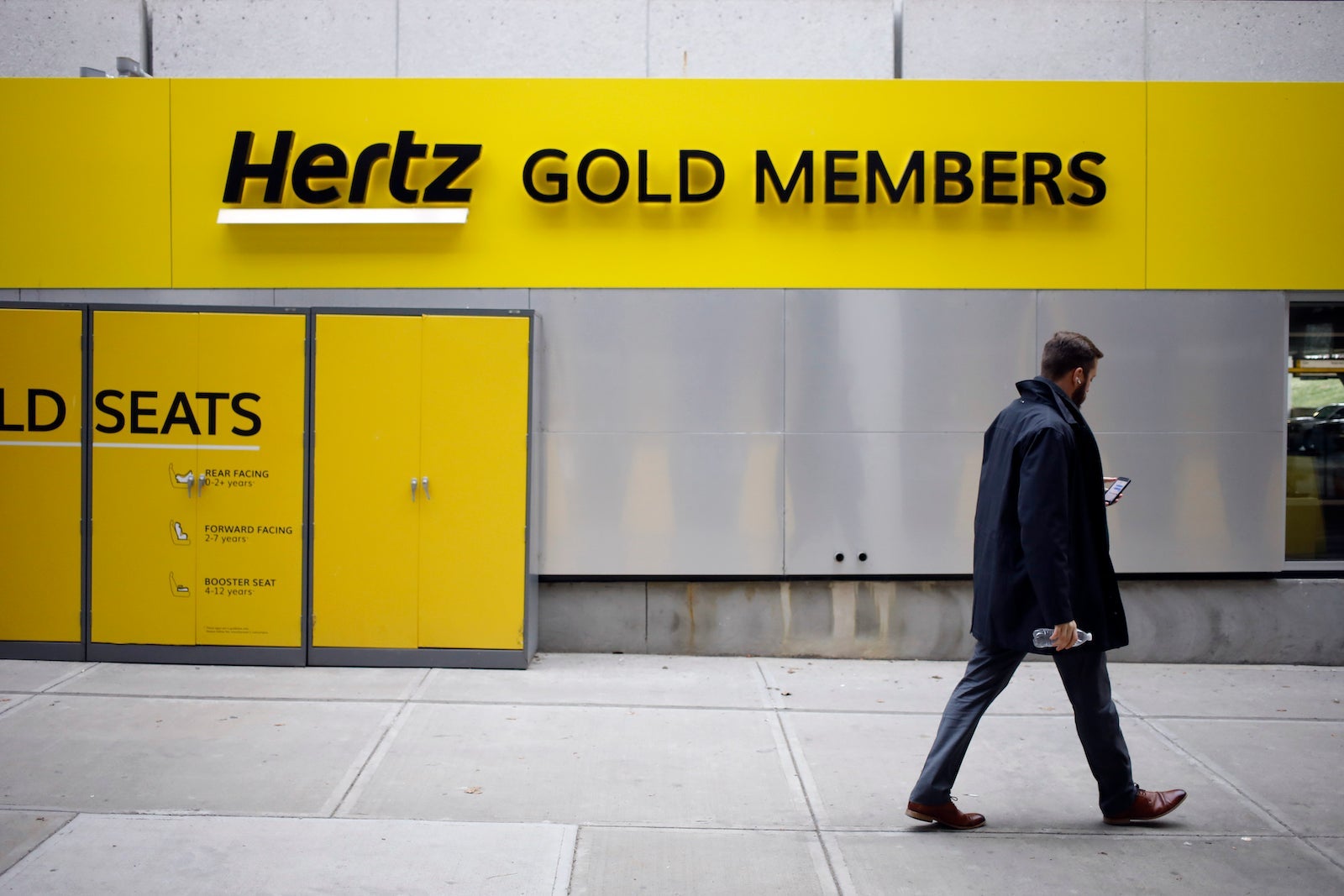Every car rental company has a “do not rent,” or DNR, list containing the names of former customers who are no longer allowed to rent vehicles with them.
In fact, Hertz, Avis, Enterprise and others sometimes permanently ban even top-tier elite members in their loyalty program if they find the circumstances warrant it.
I know this firsthand because, as a consumer advocate, banned car rental customers have flooded my helpline for years. Most of these travelers had no idea that some of their actions could lead to such severe and embarrassing outcomes.
The outcast car rental customers all want the same thing when they contact me: to get off the DNR list. They hope to make amends and get back on the road with their favorite car rental companies.
There is occasionally good news for some of these people, but only a small percentage.
Unlike airlines and cruise lines, which tend to ban problematic passengers for life, car rental companies can sometimes be forgiving. However, the path off the DNR list depends entirely on how the traveler ends up on it in the first place.
Here are the real-life experiences of a few car rental customers who found themselves banned, why they were placed on the DNR list, and what you can do to steer clear of the same fate.
Violating the terms of the car rental contract led to the DNR list

A quick way to get banned from a car rental company is by violating the terms of your contract. Hertz President’s Circle member Sean O. recently found this out.
Hertz’s DNR list was not where Sean ever imagined his name would appear. As a traveling insurance adjuster who used Hertz exclusively, he assumed his valued customer status was secure.
And it was — until he extended his last rental car contract without letting the agency know.
“I was traveling throughout the state (Florida) helping homeowners and businesses impacted by the hurricane,” Sean recalled. “Many areas I was working in had spotty Wi-Fi and cell service because of the ongoing storms. My original rental car contract was to end on September 20.”
As often happens in Sean’s line of work, the assignment took longer than was initially expected and he did not return the car on the agreed-upon date.
One whole week after Hertz expected Sean to return the vehicle, he was still driving around in it.
“I had just been so busy. But on September 27, I realized I had never called Hertz about the extension,” Sean told me. “I called the President’s Circle line and told the agent I would return the rental car the next day.”
Sean says the agent thanked him for letting Hertz know and didn’t indicate anything was wrong.
But the wheels were already in motion for Sean’s trip to the DNR list.
‘Your renting privileges have been permanently suspended’
Car rental companies take it very seriously when a customer does not return a vehicle as scheduled. Ignoring the end date on your contract and being unresponsive to outreach by employees trying to locate the vehicle is typically an express lane to the DNR list.
After Sean failed to return his rental car on time, the local branch began calling him. Hertz continued to attempt to reach him throughout the week, but Sean says he did not receive the messages.
By the time he called the President’s Circle seven days later, Hertz had already blacklisted Sean’s account. The company wanted to ensure he returned the vehicle before giving him the surprising news.
The following day, he returned the overdue rental car, still unaware of his change in status from darling customer to Hertz outcast.
A week after Sean returned the rental car, he received the following notification:
“This is to inform you that your rental and authorized operator privileges, as well as any membership in [loyalty] programs, have been permanently suspended at Hertz, Dollar, Thrifty, and Firefly car rental because you failed to respond to vehicle overdue notices, or have been unable to provide an excusable reason for not returning a vehicle, resulting in having to repossess the overdue vehicle.”
Sean spent the next several weeks attempting to convince Hertz that he had a reasonable explanation for not returning the vehicle on time. He also pointed out that he had a valid credit card on file with no preset limit and a history of sometimes overextending his rental because of the nature of his work.
Unfortunately, all his pleas fell on unsympathetic ears — or, more likely, they were filtered through artificial intelligence programs that do not possess ears at all.
Months later, Sean was still on the DNR list with no sign of Hertz changing its position.
Then Sean asked me if I could bring his case to the executive team at Hertz for reconsideration.
Hertz agrees to remove this customer from the DNR list

Unfortunately, to the detriment of consumers with issues to resolve, many companies have automated their customer service centers with artificial intelligence programs. These systems cannot make case-by-case exemptions or offers, or forgive mistakes that a human agent might forgive.
I suspected Sean had been pleading his case to AI customer service bots.
But my executive contact at Hertz and her team are real people. I believed, given Sean’s line of work and history with the company, they would likely find Sean’s banned status extreme. I sent the details of his case over to Hertz, and very quickly, Sean received good news.
Hertz restored him to the President’s Circle and returned his points, and he is back in the company’s good graces, with the understanding that in the future, he must not self-extend his contracts without alerting Hertz ahead of time.
The lesson here is: Most car rental customers who ignore the end date of their contract will end up on the DNR list. Travelers who cannot return their vehicle as scheduled must inform the company, explain why and get an official approval for an extension.
Requesting an email confirmation of the change from the car rental company is also crucial. You might need that proof if you are renting from an agency that reports overdue vehicles as stolen, which many do.
Travelers should know that many car rental branches are franchised, too. That means they are independently owned and operated. So, if one location allows you to deviate from your contract, you should never assume others will. That misunderstanding was the root of Sean’s unpleasant experience, since he had been able to self-extend rentals from other branches with no issues in the past. But that almost led to his permanent placement on Hertz’s DNR list.
Filing a credit card dispute over cleaning fees
Filing a credit card dispute over fees a car rental company wants you to pay can also lead you straight to the DNR list. Unfortunately, many consumers have mistaken understandings about when they can file a dispute or chargeback, and what “winning” one actually means.
Monica V., a former Thrifty customer, filed a credit card dispute after her last rental.
“After we returned the rental car, Thrifty notified me that it was charging me a $555 cleaning fee,” Monica told me. “My fiance smokes, but he didn’t light up in the vehicle. We probably smelled like smoke because we went to a casino. But I shouldn’t have to pay for that.”
The car rental company did not agree with Monica’s reasoning. The team did not care why the vehicle smelled like smoke, just that it did smell like smoke when she returned it.
When Monica wrote to the company with a complaint, Thrifty reiterated that she was responsible for returning the rental car in the same condition in which it had been given to her — without the odor of cigarettes. The fee resulted from the need to take the vehicle offline for a day to be deep-cleaned.
Before delving further into this case, let me just acknowledge that, from the complaints I receive each week, I know that car rental cleaning fees are out of hand these days.
Some locations routinely charge customers hundreds of dollars to vacuum dust, remove small amounts of trash and deep-clean cars unnecessarily. There is no question that cleaning fees have become a lucrative income stream for some agency branches.
Monica agreed that the car smelled like smoke after her rental. However, she was arguing that she should not have to pay for a cleaning since no one actually smoked in the vehicle.
When Thrifty disagreed, she disputed the charge with her credit card company. She won the case by default because the car rental company did not challenge the chargeback.
Monica, like many consumers, believed that the credit card company’s decision was final and that Thrifty was obligated to accept it.
However, she got a surprising lesson about what triumphing with a credit card dispute actually means for consumers.
Winning a credit card dispute doesn’t mean what you think

A few weeks after her chargeback was processed, Monica was shocked when she received a DNR notice from Hertz, the parent company of Thrifty.
The message informed her that it had sent the $555 debt to collections. Now, her credit rating was at risk.
When she contacted me to ask for assistance, she was convinced that her credit card company’s decision was binding.
“This is not only an invalid charge (no one smoked in the rental car) but has also cost me considerable time, stress, and inconvenience. After disputing the charges with my credit card company (and winning), I am on the ‘Do Not Rent’ list. They [Hertz] also sent me to collections. I travel often, which has caused major challenges when booking a car. I am the sole breadwinner of my family, and money is tight. Can you help me get off this list?”
Monica is not alone in her belief that successfully disputing a credit card charge closes the dispute permanently with no repercussions. In reality, it only definitively ends the involvement of the credit card company. For many consumers, the outcome of a credit card dispute only ushers in a new chapter in the conflict.
Car rental companies rarely respond to credit card disputes. If a merchant does respond to a chargeback complaint within 20 to 45 days (depending on the credit card), the customer wins by default.
But, one critical detail about credit card disputes that most consumers I speak to don’t know is that the outcome is not legally binding. When a consumer wins a credit card dispute, the merchant can pursue the debt in other ways, and car rental companies nearly always do, relegating the customers to the DNR list and sending the unpaid charge to a collections agency.
Because Monica seemingly acknowledged the vehicle smelled like smoke, she owed the fee. I agreed that it was pretty high compared to typical car rental cleaning charges that usually range from $250 to $450. Had she contacted me before the credit card dispute, I am confident that I could have mediated a reduction in the fee. But when I received her complaint, it was too late. I knew the only way off the DNR list would be for her to repay the $555.
That was something she was not willing to do, though, and the last time I heard from Monica, she remained on Thrifty’s DNR list.
Sometimes, car rental companies charge unfair fees and bill for damages the customer did not cause. However, in almost all cases, a credit card dispute is not the right way to resolve the problem.
Consumers should only initiate a credit card dispute as a last resort because there are serious flaws in the scope and protection of the credit card dispute process.
It is always best to use the official channels at the rental company to try to resolve a complaint. If you need a reliable name and contact information for a real person at a car rental company who can help you, send your request to my organization, Consumer Rescue, and we can provide that to you free of charge.
Making threats and behaving badly
Did you ever sidle up to the car rental counter, eager to be on your way, and discover there was not a vehicle waiting for you? Or maybe you find a massively long line ahead of you when you are running on fumes.
Frustrating scenarios like those are common occurrences at car rental agencies worldwide. However, customers should know that if they take out their frustration on employees, it can have long-term consequences.
Gordon M., a former Hertz President’s Circle member, found this out after he showed up at the rental counter and an employee questioned the corporate discount code he was using. After a long day of travel and recent problems with other Hertz locations, the request sent Gordon over the edge.
He began insulting the agent, a female employee working alone at that location.
“She asked me for proof of my association with the business that I founded. It was not my finest hour. I wholeheartedly apologize for letting my frustrations from previous rental experiences with Hertz affect my dealings with this agent. I might have raised my voice an octave or two, but I was nowhere near shouting.”
However, the loudness of his voice was not what the employee found threatening. In Gordon’s own words, which he repeated in a follow-up letter to the company, he called Hertz (and the agent in front of him) “A bunch of scumbags” and told the worker that he would be reporting her.
The agent informed Gordon that he would need to wait for a manager to arrive since she would not continue working with him. He sat down to wait, got on the phone with Hertz customer service and continued his rant.
When the manager arrived, Gordon assumed it was to defuse the situation and make things right for him.
He was wrong. The location manager was there not to appease Gordon but to protect the agent.
“He told me that Hertz had canceled my reservation and I should leave,” Gordon recalled. “I was furious, but I left and went to Sixt to rent a car. I also have a corporate account there.”
Much to his surprise, when he arrived at the Sixt counter, the agent told him the company could not rent him a car.
A few days after this incident, Gordon attempted to rent a car at another Hertz location without interacting with a counter agent. He found his name on the President’s Circle display board, went to the lot, selected a vehicle, and drove away.
But he did not get far.
When he got to the gate, an attendant informed him that he was banned from Hertz. Gordon was unceremoniously instructed to leave the car and go somewhere else. Embarrassed, he gathered his things and made the walk of shame out of the lot.
It was a far fall from the President’s Circle to the blacklist.
By the time Gordon reached out to me with his story, he was still unclear of his fate with Sixt, but he hoped to get back in the good graces of both companies.
Unfortunately for Gordon, it is rare for any company to take a customer off the DNR list if they were placed on it because of threatening or aggressive behavior toward employees.
Since I do not know Gordon personally, I could not vouch for him and I had no basis to ask Hertz to lift the ban.
Car rental agencies, just like any other company, are free to refuse service to problematic customers. I recommended he pick a new favorite car rental company and to be conscientious about his behavior in the future.
He still wanted me to share his experience, though.
“I would like your readers to know that there is no due process with these car rental companies. It was my word against the agent that day since no one else was there. But I got banned. I also think it’s outrageous that they shared my information with Sixt.”
As Gordon’s situation demonstrates, no matter where your travels take you or what challenges you encounter, never unload your frustrations on others. I am always surprised by the number of requests for help I get from self-described “nice” people who were banished from a company after taking out their anger on an employee.
Descending into face-to-face confrontations with frontline employees is aggressive and shows a lack of self-control. And remember, the person on the receiving end of such conflicts has no idea just how far that anger could go. Before confronting an employee about a problem, take a step back and imagine how the scene might look through the lens of a third party.
Many years of case files shared with me by consumers and travel companies indicate that car rental agencies, cruise lines, hotels and airlines are fed up with poorly behaved customers. And rightly so. Fellow travelers are also fed up with people who can’t maintain self-control in public. And when that happens, you just might find yourself on a company’s banned list.
Bottom line
Getting banned from a car rental company can lead to a lifetime of inconvenience. That’s especially true if you live in an area that a specific brand primarily services, or your place of employment has exclusive contracts with a single rental company.
The good news is that it is fairly easy to avoid the DNR list of your favorite car rental company. Just adhere to these simple guidelines:
- Abide by your rental contract’s terms.
- Do not file credit card disputes over fees the company says you owe; try to resolve the matter directly with the rental company.
- Maintain cordial behavior even when faced with frustrating circumstances.
The bad news is that after a company adds your name to the blacklist, it may stay there forever with no recourse.
If you have a problem with a car rental company, cruise line, airline, vacation rental agency, hotel or credit card company, send your request for help to ombudsman@thepointsguy.com, and I’ll be happy to try to help you, too.
Editorial disclaimer: Opinions expressed here are the author’s alone, not those of any bank, credit card issuer, airline or hotel chain, and have not been reviewed, approved or otherwise endorsed by any of these entities.






